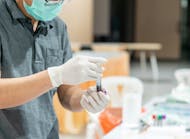Gaining a better understanding of physical frailty could eventually help people age more healthfully, suggests a research team at Johns Hopkins Medicine and Columbia University Mailman School of Public Health, in a perspective article published in Nature Aging, according to a news release from Johns Hopkins.
The researchers developed a system for diagnosing frailness, which is characterized by three or more of five key clinical signs and symptoms: weakness, slow walking speed, low level of physical activity, fatigue or exhaustion, and unintentional weight loss.
They say that frailty is a distinct state that occurs when key physiological and biological systems – including the metabolism, musculoskeletal and stress-response systems – become out of sync with one another, interacting in an unbalanced way when faced with challenges. Eventually, disharmony among these systems pushes the body across a threshold into a state of highly diminished function and resilience, explained Ravi Varadhan, PhD, Associate Professor of Oncology in the Division of Biostatistics and Bioinformatics at the Johns Hopkins Kimmel Cancer Center.
In the perspective article, Varadhan and colleagues point to Johns Hopkins’ 2012 Women’s Health and Aging Study II research initiative as evidence. In this study, volunteers from 85 to 94 years old received a standard oral glucose tolerance test, in which their blood glucose and blood insulin levels were measured after they consumed a high-sugar drink. Those with diagnosed frailty had exaggerated responses, on average, to both measures and were far slower to return to blood sugar baseline than those who weren’t frail – a sign of a failing metabolic system.
Similarly, frail women participating in the same study had molecular markers of slower muscle recovery after exercise, which is an indicator of a weakened musculoskeletal system. Also, following a simulation test, these women produced less cortisol, a hormone that indicates the body’s response to stress and is a sign of a dysregulated stress response.
Interventions that target multiple systems at once, such as physical exercise, rather than those that have an effect on just a single system, such as a drug that lowers blood sugar, could potentially prevent, slow or reverse frailty, the researchers report.





